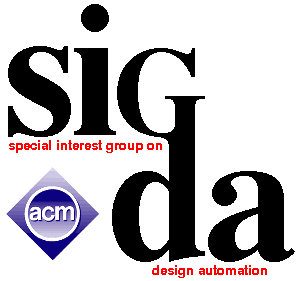
 |
SIGDA's CADathlon at ICCAD
Sunday, Nov. 1, 2009
|

HomeWinners!!PicturesProblems
Contest
|
Problems and ReferencesTo download the tar.gz file for all related papers, click here.Problem 1: Analysis & Circuit DesignContributed by: Michael Moffitt, IBM Austin Research LabsOverview: Yield Analysis of SRAMsA Radial Exploration Approach to Manufacturing Yield Estimation and Design Centering, Problem 2: Physical DesignContributed by: Cliff Sze, IBM Austin Research LabsOverview: Clock distribution for high-performance chipsSizing of clock distribution networks for high performance CPU chips, Problem 3: Logic & High-Level SynthesisContributed by: Smita Krishnaswamy, IBM Yorktown HeightsOverview: SAT based functional decompositionScalable exploration of functional dependency by interpolation and incremental SAT solving, Problem 4: System Design and AnalysisContributed by: Sudarshan Banarjee, DenaliOverview: Integer Linear Programming (ILP) formulation for memory partitioning and data allocation.An Integer Linear Programming Based Approach to Simultaneous Memory Space Partitioning and Data Allocation for Chip Multiprocessors, Problem 5: Functional VerificationContributed by: Hao Zheng, University of South FloridaOverview: SAT based safety checking of sequential circuitsSymbolic Model checking without BDDs, The AIGER And-Inverter Graph (AIG) Format , Version 20070427, Problem 6: Bio EDAContributed by: Marc Riedel, University of MinnesotaOverview: Stochastic Simulation of Chemical KineticsStochastic Simulation of Chemical Kinetics, Computer PlatformDuring the contest one desktop computer will be available per team. This will be a Dell Optiplex 745 Pentium D (3.4Ghz) running a standard installation of CentOS Linux 5.x. All necessary software and the problem statements will be pre-installed. In your home directory you will find a beginning directory structure to organize your work and initial problem frameworks such as parsers.One or more of the problems may require solving linear programs or satisfiability problems. For this, we will provide lp_solve and MiniSat and recommend familiarizing yourself with them. Of course, you are also welcome to program your own solvers. You will be allowed to bring in any written or printed materials, but no electronic storage media or computing devices. (If you have a preferred VIM or Emacs configuration, you will need to print them out beforehand and type them in.) Whatever you bring in shall stay in the room until you decide to leave the room at the end of the day. You will not have any internet or phone access during the competition, and you are expected not to discuss any questions with colleagues other than your team member.
|
|
| CADathlon 2009 is over. Congratulations to the winners! |